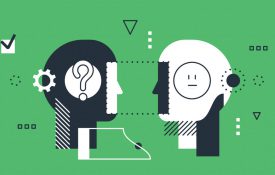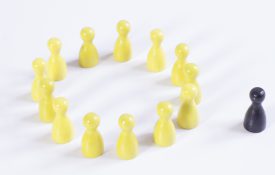-

Negative Emotions Are Murkier, Less Distinct in Adolescence
Data from participants ranging from 5 to 25 years old suggest that adolescents don’t distinguish between negative emotions as clearly as younger children and adults in their 20s do.
-
How to use stats to fight racial inequality, not support it
Using statistics to inform the public about racial disparities can backfire. Worse yet, it can cause some people to be more supportive of the policies that create those inequalities, according to new research. “One of the barriers of reducing inequality is how some people justify and rationalize it,” says Rebecca Hetey, a psychology researcher at Stanford University. “A lot of people doing social justice work wonder why attitudes are so immune to change.
-
Thanksgiving Dinner May End Sooner If Guests Pass the Gravy across a Partisan Divide
Mixing family and politics has always been fraught. I know—my mother was a Democrat, my father a Republican. The night Jimmy Carter won the presidency, dad slept in the guest room. For the U.S., the bitter campaign that ushered in Pres. Donald Trump in 2016 was a lot like that of 1976 in my house. Many families were politically divided, and the calendar forced the issue: The cherished American holiday Thanksgiving came just days after the election. Anecdotal reports suggest family feasts that year were less festive than usual, with many Americans struggling to sit across the table from relatives whom they knew had voted for a candidate they loathed.
-
Applicant’s race or gender doesn’t appear to influence NIH peer reviewers
An unusual experiment to test whether an applicant’s apparent race or gender influence how their grant proposal is scored has found no evidence of bias. The study, which involved re-evaluating proposals already funded by the National Institutes of Health (NIH) in Bethesda, Maryland, after the applicants’ names had been altered, is part of an ongoing effort by NIH officials to detect bias in their vaunted peer-review process. Some scientists who have read the NIH-funded study, described in a preprint posted online on 25 May, object to what they say is its implication that bias doesn’t exist. But the authors say they are making no such claim.
-

Science of Racism Examined in New Set of Research Articles
Psychological scientists describe research on the enduring and often hidden presence of racism at both the interpersonal and societal levels in the June issue of Current Directions in Psychological Science.
-
New Research From Psychological Science
Read about the latest research published in Psychological Science: A Cognitive-Ecological Explanation of Intergroup Biases Hans Alves, Alex Koch, and Christian Unkelbach People often evaluate minorities and out-groups negatively. These are usually novel groups and thus tend to be associated with unique attributes that differentiate them from other groups. But unique attributes are also more negative than positive because of their higher diversity and lower frequency. The authors propose a model that combines these two theories to explain the negative evaluation of minorities and out-groups.

